Iran’s exiled queen and crown prince to be honored by Nixon Foundation
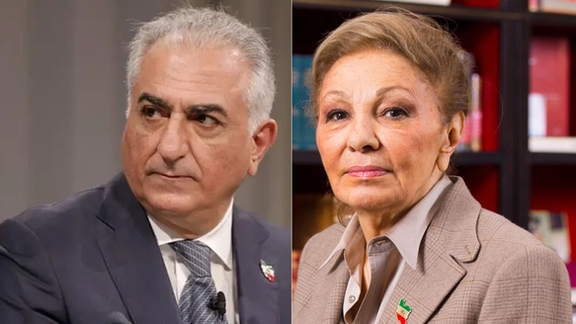
Iran’s exiled Queen, Farah Pahlavi, and her son, Prince Reza Pahlavi, will be honored as recipients of the Architect of Peace Award, the Richard Nixon Foundation has announced.

Iran’s exiled Queen, Farah Pahlavi, and her son, Prince Reza Pahlavi, will be honored as recipients of the Architect of Peace Award, the Richard Nixon Foundation has announced.
The foundation, in a statement on its website, highlighted that both the Queen, who has been in exile since the Islamic Revolution of 1979, and the Crown Prince, stand as "powerful symbols of opposition to the terrorist theocratic regime now ruling Iran."
It further underscored their relentless dedication over the past four decades, noting that "they have each devoted more than 40 years to championing religious freedom in Iran, advocating for a democratic form of government backed by popular vote, and bringing attention to myriad ongoing human rights abuses in Iran."
The statement also recognized the long-standing relationship between Mohammad Reza Shah Pahlavi, the last Shah of Iran, and President Richard Nixon, a bond that began in 1953.
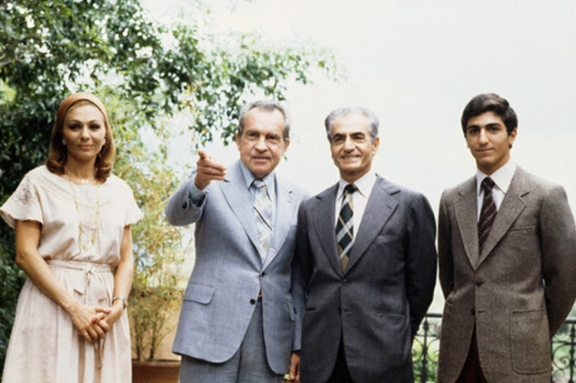
The foundation's website elaborated that "the late Shah, who ruled Iran from 1953 to 1979, was a strong ally of the United States and a bulwark in the Cold War with the Soviet Union." It further detailed how the young Vice President Nixon and the young Shah first met in 1953, forming a close personal relationship that spanned nearly three decades.
Recalling Nixon's reflections in a 1983 interview, the statement quoted him as saying, "I knew the Shah better than any world leader I had met over the past 37 years of public life," and added that Nixon found the Shah to be "a very sensitive man, a very intelligent man, one who understood the world as well as any leader that I had met."
The Shah always faced both domestic and international opposition by left-leaning individuals and groups, who accused him of being too close to the United States at a time when there was a global ideological and military confrontation with the Soviet Union.
Established in 1995, shortly after the passing of President Nixon, the Architect of Peace Award was created to honor those who exemplify his enduring vision of fostering a more peaceful world.
Over the years, this distinguished award has been bestowed upon a notable array of individuals, including former Presidents Gerald Ford, George H.W. Bush, and George W. Bush; former Secretaries of State Henry Kissinger and Mike Pompeo; Senators Elizabeth Dole, Joe Lieberman, and John McCain; and Ambassadors Walter and Leonore Annenberg, as well as Robert C. O’Brien.
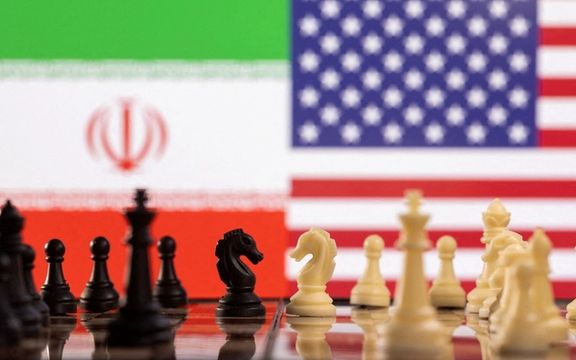
Supreme Leader Ali Khamenei told Iran's new government there is "no barrier" to engaging with the "enemy" on the nuclear issue. While Western media framed this as 'opening the door' to talks, some Iran watchers remain skeptical.
Khamenei's warned that Washington should not be trusted should any talks under President Masoud Pezeshkian resume.
The timing and rhetoric could all be part of a deception campaign for sanctions relief, some experts and Iran watchers believe.
"World powers should see the Supreme Leader’s willingness to restart nuclear talks as a simple ruse to obtain continued sanctions relief regardless of who is elected US president," said Andrea Stricker, the Deputy Director of the Foundation for Defense of Democracies (FDD)’s Nonproliferation and Biodefense program.
A State Department spokesperson told Iran International that it will judge Iran’s leadership by their actions, not their words.
The US approach, they said hasn't changed, and that If Iran wants to demonstrate seriousness, they should stop nuclear escalations and start meaningfully cooperating with the IAEA.
Stricker views Khamenei's remarks as a charade, with the nation having had more than three years to revive a nuclear deal under the Biden administration. Instead, the world saw the Islamic Republic advance its nuclear program by enriching enough uranium for several bombs.
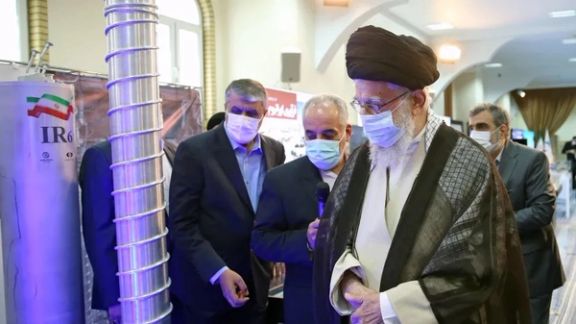
US Secretary of State Antony Blinken said that Iran’s breakout time, which is the amount of time needed to produce enough weapons grade material for a nuclear weapon, “is now probably one or two weeks." Blinken made the comments last month at the Aspen Security Forum.
The preferred method of containment under the Biden administration has been diplomacy and allowing Iran to circumvent economic sanctions. The Biden administration also released around $16 billion of Tehran's frozen funds in 2023, before Iran's proxy, Hamas, launched its October 7 attack on Israel.
The administration engaged in more than a year of indirect negotiations with Tehran in 2021 and 2022. Their goal was to revive the Iran nuclear deal which the US withdrew from under the Trump administration in 2018.
Iran maintains that its nuclear program is peaceful and that it has no plans to develop nuclear weapons, but the UN's nuclear watchdog warned that Iran is enriching uranium to near weapons-grade levels. Iran's estimated stockpile of enriched uranium had reached more than 30 times the limit set out in the 2015 JCPOA nuclear agreement between Tehran and world powers.
The Islamic Republic has also barred some of the Vienna-based agency’s inspectors.
Iran's new president Masoud Pezeshkian campaigned on a promise to reengage with the West. Of significance is that the country's new foreign minister, Abbas Araghchi, was heavily involved in 2015 negotiations on the deal.
For Kasra Aarabi, the Director of IRGC Research at United Against Nuclear Iran (UANI), the talks may be used by Khamenei as a front to get more assets unfrozen - preparing for and anticipating a Donald Trump presidency. The former president, who is attacking Biden's foreign policy record, is expected to be tougher on Iran's Islamic government.
"Khamenei may also be using this as a final attempt to get more assets unfrozen prior to a new US administration. If this is the case, expect threats/escalation in the next few months to force diplomatic concessions," said Aarabi.
The previous Trump presidency saw US policy that advocated for “maximum pressure” against the Iranian ruling system. It may do so again, if he is elected president for a second term.
The regional conflict between Iran and Israel, reached a dangerous escalation after the assassination of Hamas leader Ismail Haniyeh in Tehran last month. The potential for a regional conflict between the two adversaries may also be used as leverage by Iran, promising calm in exchange for benefits.
On X, Jason Brodsky, the policy director of UANI posted that the door was never shut for negotiations on Iran's nuclear ambitions.
The tactic, according to Brodsky is one Iran has used time and time again. One that allows the regime to benefit from the prospect of talks as a lure to neutralize pressure.
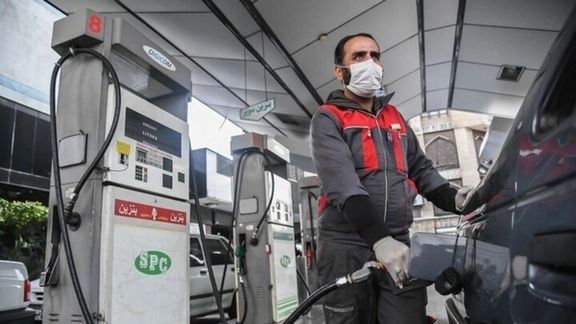
Iranian President Masoud Pezeshkian has criticized the lack of logic in importing gasoline at high market prices only to sell it domestically at much lower, heavily subsidized rates.
Iran has struggled with a growing gasoline deficit since 2022, importing at least 1.5 billion liters (396 million gallons) of gasoline during the last fiscal year, which ended on March 20, according to an official Oil Ministry document obtained by Iran International.
Officials report that the gasoline deficit has worsened this year. Additionally, Iran is grappling with the daily smuggling of 5 million liters (1.32 m gallons) of gasoline to neighboring countries, because of the cheap subsidized price.
The Iranian government has not disclosed specific details about the volume and value of gasoline imports. However, President Masoud Pezeshkian estimated the annual import cost at $8 billion annually during an interview last month. Currently, the Free on Board (FOB) price of gasoline in the Persian Gulf exceeds 55 cents per liter, while Iran sells rationed gasoline (60 liters per month per vehicle) at just 15,000 rials (2.5 cents) per liter, and non-rationed gasoline at 5 cents a liter.
Pezeshkian's remarks suggest that a significant increase in gasoline prices may be necessary—a sensitive issue that previously triggered widespread protests and a brutal crackdown by the Islamic Republic in November 2019.
His comments also come against the backdrop of a sharp rise in the US dollar exchange rate, from 110,000 rials to 600,000 rials per dollar since November 2019, further highlighting the disparity between domestic and global gasoline prices. Additionally, the devaluation of the rial is a consequence of the Islamic Republic's economic policies, including systemic inefficiencies, a lack of investment in new refineries, outdated infrastructure, and the impact of Western sanctions. Blaming the public for the gasoline crisis under these circumstances is therefore unreasonable.
Last year, Iran's base gasoline production was approximately 97.13 million liters per day (ml/d). After blending with a significant amount of non-standard additives, this volume increased to 111 ml/d, while daily consumption stood at 115 ml/d. However, recent statements from oil officials suggest that gasoline consumption in recent weeks has been closer to 121 ml/d, with a spike in August due to a large pilgrimage to Iraq.
Pezeshkian’s call for higher gasoline prices comes despite the Oil Minister’s announcement on August 22 that no pricing changes are currently being considered to address the gasoline imbalance. Pezeshkian further stressed that Iranian economists should protest against the flawed policies being implemented, as the low price of gasoline contradicts economic principles.
One key factor deepening Iran's gasoline deficit is the lack of new refineries being added to Iran's production capacity since 2019. Additionally, around one million high-fuel-consumption domestic vehicles have been introduced annually into the market in recent years.
Pezeshkian, without acknowledging the absence of new refineries and the inefficiencies of existing ones—where one-quarter of crude oil is still converted into low-value products like bitumen and mazut (six times more than modern refineries)—criticized the low gasoline prices. He lamented, "I don’t have money for wheat, I don’t have money for livestock inputs, I don’t have financial resources to pay retirees, yet we buy gasoline at a high price and sell it cheaply."
According to estimates by the International Energy Agency (IEA), Iran had $52 billion in hidden fossil fuel product subsidies in 2022, including natural gas and oil products such as gasoline. One-fourth of this figure represents the difference between Iran’s consumer gasoline price and global prices. In 2022, Iran ranked second worldwide, after Russia, with $127 billion in fossil fuel subsidies. The IEA has not yet published updated figures.
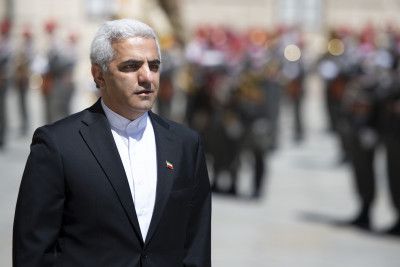
The Iranian ambassador to Austria, Abbas Bagherpour Ardekani, has ignited a political firestorm with a social media post that has drawn condemnation and calls for diplomatic response.
The post on X displayed the flag of Hezbollah, the Iran-backed militia group listed as terrorist by the United States, was accompanied by the statement, "Hezbollah will be victorious."
His act has sparked outrage across Austria, as the display of Hezbollah symbols is explicitly banned in the country.
The timing of Ardekani’s post could not have been more incendiary, coming shortly after Hezbollah's intensified rocket and drone attacks on Israel. Hezbollah, recognized as a terrorist organization by numerous countries, including Austria since May 2021, is notorious for its stance against Israel. The ambassador’s actions are seen as a direct violation of Austrian law.
Austrian politicians were swift in their response. Leaders from the Greens and the SPÖ expressed their fury and demanded immediate action from the foreign ministry. Green Party leader Sigrid Maurer called for the ambassador's recall, urging the ministry to "send a clear signal against terror." SPÖ deputy leader Eva-Maria Holzleitner echoed the sentiments, condemning the ambassador's disregard for Austrian law and the safety of Israel.
The Iranian embassy remained silent as the post stayed online for an extended period, further fueling the outcry. The Austrian ministry of foreign affairs eventually confirmed on August 27 that the ambassador had been summoned and was reminded of his obligation to adhere to the laws of the host country as stipulated by the Vienna Convention.
Complicating the situation is the potential clash between Austrian law and the ambassador’s diplomatic immunity, which could shield him from prosecution. Under Austrian law, Ardekani could face a fine of up to 10,000 euros or a one-month prison sentence for his post. Yet, diplomatic immunity might prevent such penalties, leaving Austria with limited recourse.
This incident is not an isolated case but rather part of a disturbing pattern of behavior by Iranian diplomats. Earlier, Ahmad Sadeghi, the Iranian ambassador to Australia, sparked outrage with an anti-Semitic post predicting the "destruction of Israel by 2027."
"It's extremely dangerous and disturbing to hear that sort of rhetoric, especially at a time when the Jewish community feels so vulnerable and threatened," Alex Ryvchin of the Executive Council of Australian Jewry told Iran International on Monday.
Ryvchin highlighted the Iranian government's long-standing strategy of dehumanizing Jews and inciting violence against them worldwide by labeling Jews and the state of Israel as a "cancer to be eradicated." He expressed grave concern over the Australian Government's "inadequate" response to this dangerous rhetoric, noting that Iran’s ambassador, despite his inflammatory statements, continues to operate freely in Canberra.
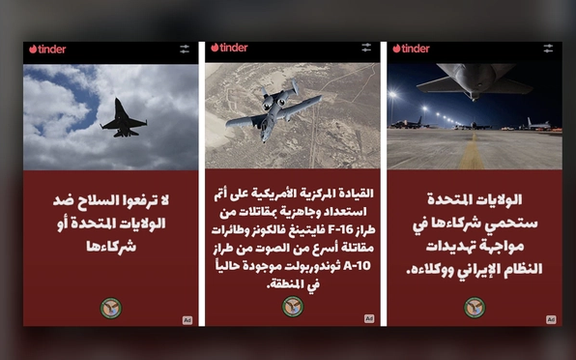
The US military has published a rare warning ad on the dating app Tinder, highlighting its readiness to counter threats by Iran and Hezbollah to attack Israel in retaliation for the killing of senior 'Resistance Front' leaders.
The ads published in Arabic included messages such as "Do not take up arms against the US or its partners" and "The US will protect its partners against threats from the Iranian regime and its proxies."
The advertisements which appeared on Tinder for users in Lebanon were posted along with images of warplanes and the logo of CENTCOM. "CENTCOM is fully prepared with F-16 Fighting Falcon fighters and A-10 Thunderbolt fighters already in the region."
It is not clear why the US military has chosen a dating app for its message to Iran. Hezbollah fighters are said to be banned from using cellphones as their location might be tracked. The Lebanese civilians seem to be the main audience of the message, even though they cannot do much to stop an Iran-led strike.
The warning comes amid concerns that the Iranian-Israeli tensions would lead to an all-out regional war. Iran has so far refrained from its promised retaliatory attack against Israel, while repeating the claim that it has not abandoned the plan to take revenge for the Israeli killing of Hamas chief Ismail Haniyeh.
On Monday, Iran's top general stressed that “taking revenge for this criminal act, whether by the axis of resistance, or by the Islamic Republic of Iran, is certain."
“Members of the axis of resistance, each based on their capabilities and considerations, will carry out their revenge, some of which we witnessed yesterday,” Major General Mohammad Bagheri added, referring to the attacks on Israel by Hezbollah during the weekend.
Bagheri’s remarks can be read as a sign that Iran could opt out of an attack against Israel from its soil and limit its response to ‘proxy’ operations by Hezbollah and other armed groups in the region. Still, the US is continuing to boost its military presence in the region in anticipation of a major escalation.
"It's very difficult to know what the Iranians are thinking on any given day. They may remain prepared and postured should they want to conduct some sort of large-scale attack on Israel," White House national security spokesman John Kirby told Fox News on Tuesday. "That's why we remain prepared and postured to defend against that attack and to defend our own troops and facilities in the region."
Kirby said the US has got "a couple of (aircraft) carriers there right now and there are other assets, both air and ground based, available to the US. We're prepared and postured should we need to do that. We obviously don't want to see that outcome."
US Defense Secretary Lloyd Austin has directed two aircraft carrier strike groups to remain in the Middle East, bolstering the US military presence amid Iran-Israel tensions, the Pentagon announced on Sunday.
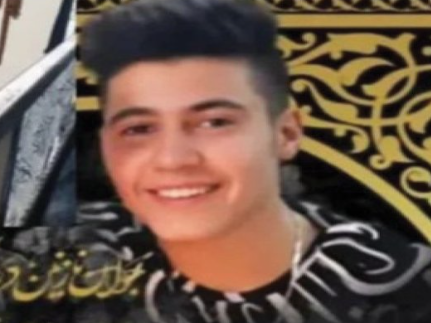
A 21-year-old man, Amirreza Ajam Akrami, was publicly executed in Shahroud, northern Iran, on Monday, according to the Oslo-based Iran Human Rights (IHR) organization. This execution marks the first public hanging in Iran in 2024.
Mahmood Amiry-Moghaddam, Director of IHR, condemned the act, stating, “Public hanging is an inhumane, cruel, and degrading act that not only victimizes the defendant but also the general public.”
Amiry-Moghaddam called on the international community to “condemn this barbaric punishment in the strongest terms,” warning that “we will witness more public executions if the international community fails to respond appropriately.”
Akrami had been on death row for about a year after being convicted of murder. Mohammad Sadegh Akbari, head of the judiciary in Semnan province, confirmed that Akrami was sentenced to execution by Branch 49 of the Supreme Court, for the “intentional murder” of Mahmoudreza Jafar Aghayi using a hunting weapon, as reported by Iran’s state-affiliated ISNA news agency.
While this is the first public execution in Iran this year, the Islamic Republic has already executed at least 345 people as of August 9, according to reports from rights groups.
In 2023, Iran executed 853 people, the highest number in eight years, according to Amnesty International. This marked a 48% increase from 2022 and a 172% rise from 2021. Last year, Iran carried out seven public executions, according to IHR.
Between July 22 and August 21 alone, at least 106 individuals were executed in Iranian prisons, a reminder of the brutal measures the Islamic government has used for four decades despite international criticism, reported the US-based HRANA news agency on Thursday.
The executions have not been limited to those convicted of violent crimes. Many of those hanged were political prisoners, protesters, and individuals from ethnic and religious minority groups, often sentenced in sham trials that lack transparency and due process, the report said.
This wave of executions is part of a broader strategy by the Iranian government to instill fear and suppress any form of resistance. Since the nationwide protests in 2022, triggered by the death of Mahsa Amini in morality-police custody, Iran has weaponized the death penalty as a means of crushing dissent and tightening its authoritarian grip on the nation.